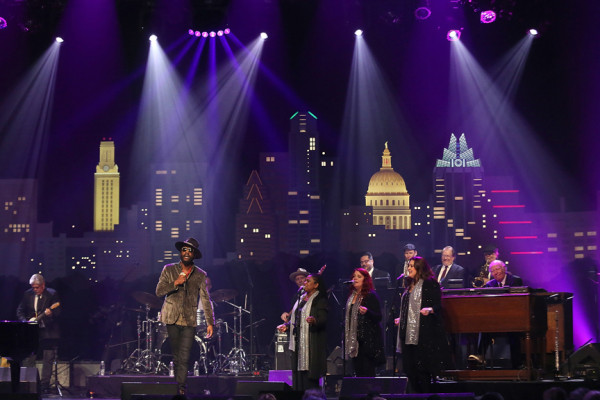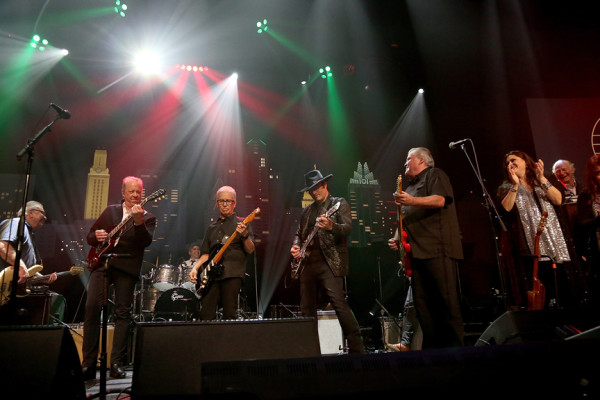On their own, Common, Robert Glasper and Karriem Riggins are powerhouses. But put this top tier rapper, keyboardist/producer extraordinaire and renowned drummer/producer together and you have magic. As August Greene, the trio released a stellar debut LP earlier this year that garnered praise from coast to coast. Now, for the final taping of Season 44, the group hit the ACL stage for a riveting set that crossed genres as easily as it made the audience’s booty move.
“We’re honored to be here,” said Common after ACL executive producer Terry Lickona’s opening introduction. Joined by four backing musicians, the group opened with its memorable radio hit “Black Kennedy,” deftly adding the chorus of Bon Jovi’s “Livin’ On A Prayer” to this celebration of black excellence. Common introduced the next song “Practice,” saying it’s about not knowing all the answers out of the box, and detailed getting through this spiritual practice called life— the powerful track was enhanced by backing singers Samora Pinderhughes and Muhsinah Abdul Karim. Bassist Burniss Travis signaled the next tune with a beautifully melodic solo, before Pinderhughes joined Common at center stage for “Let Go.” The rapper encouraged the crowd to let go of any of their own negative energy, and they happily obliged. While the beat went on, the group segued directly into “Geto Heaven,” a tune from Common’s breakthrough classic Like Water For Chocolate. The band stayed with Common’s solo career for Be’s infectious “Go,” which earned big cheers. Common talked about working with the late producer J Dilla, leading the audience into his chant from “Thelonius,” another number from Chocolate. He then reached back almost a quarter of a century for “I Used to Love H.E.R.,” from his third solo LP Resurrection, quoting his colleagues, hip-hop all-stars Big Daddy Kane, ODB, Grand Puba, the Pharcyde and Nas along the way.
We’re always thrilled when an artist presents new music on our stage, and August Greene obliged with “The Rival (She’s Callin),” a soulful new track from the band’s in-progress second LP. Segueing into “Come Close,” Common brought up a thrilled audience member and dazzled with his mic skills, improvising about her, the show and even Austin over the beat. The rhythm turned jazzy, allowing Glasper to show off the piano skills that elevated him to the top of the game in the modern jazz world. He wasn’t satisfied only displaying his keyboard skills, though – the Grammy-winning jazz and R&B musician challenged the Grammy-laden rapper to a (one-sided) rap battle. That led into a vocal solo from backing vocalist Karim and a drum solo from Riggins. The drummer wasted no time after concluding his improv, driving right into “No Apologies,” a breathless burner from August Greene highlighted by a frisky Glasper solo.
Dissatisfied with the opening take of “Black Kennedy,” Common called for another take. The crowd certainly didn’t mind another “beautiful ride.” Common brought an ecstatic tween onstage for the respect anthem – and final song – “The Light,” before turning the chorus of his Like Water For Chocolate cut over to the crowd. “This has been a blessing tonight,” Common told the audience as the band took bows and exited the stage. It was a great way to end the season, and we can’t wait for you to see it when it broadcasts early next year on your local PBS station.


